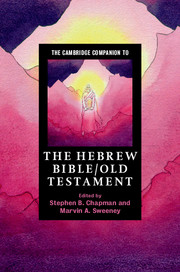Book contents
- Frontmatter
- Contents
- List of Tables, Maps, and Figures
- List of Contributors
- List of Abbreviations
- Introduction
- Part I Text and canon
- 1 Texts, titles, and translations
- 2 Collections, canons, and communities
- Part II Historical background
- Part III Methods and approaches
- Part IV Subcollections and genres
- Part V Reception and use
- Index
- Cambridge Companions to Religion (continued from page iii)
- References
2 - Collections, canons, and communities
from Part I - Text and canon
Published online by Cambridge University Press: 05 July 2016
- Frontmatter
- Contents
- List of Tables, Maps, and Figures
- List of Contributors
- List of Abbreviations
- Introduction
- Part I Text and canon
- 1 Texts, titles, and translations
- 2 Collections, canons, and communities
- Part II Historical background
- Part III Methods and approaches
- Part IV Subcollections and genres
- Part V Reception and use
- Index
- Cambridge Companions to Religion (continued from page iii)
- References
Summary
What is the best way to refer to the collection of books treated in this volume?
Answering that question is tricky, controversial, and revealing. Perhaps in no other discipline is there as much confusion and disagreement about what to call its own subject matter. Old Testament? Hebrew Bible? First Testament? Jewish Scripture? Tanakh? The profusion of proposed titles has resulted not only from a well-intentioned sensitivity to sociological diversity but also from an increased awareness of the fundamentally tradition-specific nature of this literature. Thus, the deeper question at stake in the current clash of titles is whose literature this collection is supposed to be. Because there is not simply one answer to this question, there is also not only one answer to the question of what to call it.
Sometimes it is claimed that only with the “New” Testament did Jewish Scripture become “old.” Indeed, as far as can be determined, the term “Old Testament” first appears toward the end of the second century CE as a literary title. After receiving an inquiry about the proper scope of Jewish Scripture (c. 170 CE), Melito, Bishop of Sardis, describes how he journeyed eastward to learn more accurately “the books of the old covenant” (ta tēs palaias diathēkēs biblía). However, the terms “new covenant” and “old covenant” already appear in the Bible itself, although there they designate the divine-human relation more broadly, particularly with regard to legal obedience, and not exclusively a written document. The book of Jeremiah envisions a “new covenant with the house of Israel and the house of Judah” in which the law will become so internalized that instruction is no longer necessary (Jer 31:31–4). This “new covenant” is treated in the New Testament as having been fulfilled in Christ (Luke 22:20; 1 Cor 11:25; Heb 8:8, 13; 9:15; 12:24). Correspondingly, the term “old covenant” appears in the New Testament as a designation for Jewish biblical law (2 Cor 3:14; Heb 9:1). Toward the end of the second century CE, Tertullian renders the Greek term “covenant” (diathēkē) by the Latin testamentum (“will”), a translation that reflects a growing association between “covenant” as a historical mode of divine-human interaction and “covenant” as a written record. So there is no reason to view the late second-century usage of “Old Testament” as representing any major innovation.
- Type
- Chapter
- Information
- Publisher: Cambridge University PressPrint publication year: 2016



